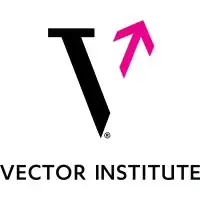 | |
| Formation | 2017 |
|---|---|
| Type | Independent, nonprofit artificial intelligence organization |
| Purpose | Research in machine learning |
| Headquarters | Toronto, Ontario, Canada |
Employees | 714[1] |
| Website | www |
The Vector Institute is a private, non-profit artificial intelligence research institute in Toronto focusing primarily on machine learning and deep learning research. As of 2023, it consists of 143 faculty members and affiliates — 38 of which are CIFAR AI chairs — 57 postdoctoral fellows, and 502 students.[2] Along with the University of Toronto, the Vector Institute is affiliated with faculty from universities across Ontario, as well as British Columbia and Nova Scotia.[2]
Along with Montreal's Mila (research institute) and Alberta's Amii (research institute), the Vector Institute is a member of the Pan-Canadian Artificial Intelligence Strategy.[3]
History
Vector was established by Brendan Frey, Geoffrey Hinton, Raquel Urtasun in 2017[4] with the objectives of retaining and recruiting researchers in Toronto and encouraging companies to establish labs in the city.[5]
On January 2, 2018, Garth Gibson became Vector's first president and CEO,[6] and in 2023, would be replaced by Tony Gaffney.[7] The institute was housed in the MaRS Discovery District[8] and, in 2024, moved to the Schwartz Reisman Innovation Center.[9]
Funding
At the end of its founding, the Vector Institute received a combined total of $200 million CAD from private and public sectors.[10] The sources of its private sector funding include, among others, Uber,[11] Google,[12] and Shopify.[13] In 2019, the Government of Ontario cut its funding of CIFAR and the Vector Institute by $24 million CAD.[14] As part of the Pan-Canadian Artificial Intelligence strategy, the Vector Institute, Mila, and Amii received another $60 million CAD in 2021 from the Government of Canada.[15]
Operations
The institute supports foundational and applied AI research,[1] and mitigates brain drain in Canada.[16] Their research priorities are:[1]
One of the goals of the institute is to support AI adoption in industries. They have helped reduce energy consumption at Telus,[17] built recommendation systems with Wahi,[18] and partnered with Kids Help Phone to build tools that help guide councillors during conversations with children.[19] They have built open source tools to monitor clinical models in production.[20]
The institute has given out $2 million CAD in masters scholarships, valued at $17,500 each.[21]
Faculty
As of 2023, Vector's research is led by Chief Scientific Advisor Geoffrey Hinton, and Research Directors Daniel Roy and Graham Taylor.[22] Other faculty include, among many others, Alán Aspuru-Guzik, Brendan Frey, Gillian Hadfield, and Sheila McIlraith.[22]
Board of Directors
As of March 31, 2023, the Vector Institute's board of directors consists of:[2]
- Ed Clark
- Janet Bannister
- Charmaine Dean
- Janet L Ecker
- Chaviva Hosek
- Nadir Mohamed
- Michael Serbinis
- Terrence Sullivan
- Melanie Woodin
References
- 1 2 3 "Vector Research". Retrieved December 30, 2023.
- 1 2 3 "Vector Annual Report 2022-23" (PDF). Vector Institute. 2023.
- ↑ Kathleen Sandusky (27 April 2023). "Canada's AI leadership strengthened through new and renewed Canada CIFAR AI Chairs under the Pan-Canadian AI Strategy". Canadian Institute for Advanced Research. Retrieved December 5, 2023.
- ↑ Jennifer Robinson (March 30, 2017). " "Toronto's Vector Institute officially launched". University of Toronto Press. Retrieved November 29, 2023.
- ↑ Cade Metz (March 21, 2022). "Toronto, the Quietly Booming Tech Town". NYT. Retrieved December 29, 2023.
- ↑ Jessica Galang (September 26, 2017). "Vector Institute names Garth Gibson as CEO". Betakit. Retrieved December 29, 2023.
- ↑ Charles Mandel (January 4, 2023). "Vector Institute taps seasoned executive Tony Gaffney to lead AI hub for next five years". Betakit. Retrieved December 29, 2023.
- ↑ Kate McGillivray (March 29, 2017). "Canada 'lost the lead' on artificial intelligence. Here's how Toronto will get it back". Canadian Broadcasting Corporation. Retrieved December 30, 2023.
- ↑ Sarah Law (March 25, 2019). "U of T gets $100M donation for innovation centre studying AI". Canadian Broadcasting Corporation. Retrieved December 30, 2023.
- ↑ Denny Thomas (March 28, 2017). "Canadian government, businesses back $150 million artificial intelligence institute". Reuters. Retrieved December 30, 2023.
- ↑ Travis Kalanick (May 8, 2017). "Transforming transportation in Toronto". Uber. Retrieved December 30, 2023.
- ↑ Darrell Etherington (March 30, 2017). "Google bets on AI in Canada with Google Brain Toronto and Vector Institute investment". Techcrunch. Retrieved December 30, 2023.
- ↑ Jessica Galang (March 30, 2017). "Shopify, Google among 30 companies committing combined $80 million over 10 years to Vector Institute". BetaKit. Retrieved December 30, 2023.
- ↑ "Ontario government cuts $24 million in AI research funding". Canadian Broadcasting Corporation. May 21, 2019. Retrieved December 30, 2023.
- ↑ "Government of Canada launches second phase of the Pan-Canadian Artificial Intelligence Strategy". June 22, 2022. Retrieved December 30, 2023.
- ↑ "Garth Gibson: Celebrating Vector's First Year in the AI Ecosystem". Vector Institute. March 29, 2018. Retrieved December 30, 2023.
- ↑ Kathleen Sandusky (April 17, 2023). "Canada's three National AI Institutes advance AI solutions for energy and the environment". CIFAR. Retrieved December 30, 2023.
- ↑ "Wahi Launches First AI-Powered Realtor Recommendation System in Canada". Newswire. June 22, 2023. Retrieved January 1, 2024.
- ↑ Nicole Ireland (July 5, 2023). "Kids Help Phone seeking help from AI tech to meet demand for mental health support". Toronto Star. Retrieved December 30, 2023.
- ↑ Norm Tollinsky (November 1, 2022). "AI centres of excellence and companies collaborate on apps". Canadian Healthcare Technology. Retrieved December 30, 2023.
- ↑ Charlize Alcaraz (May 11, 2022). "Vector Institute awards nearly $2 million in scholarships for Ontario AI students". BetaKit. Retrieved December 30, 2023.
- 1 2 "Vector Faculty". Retrieved December 30, 2023.